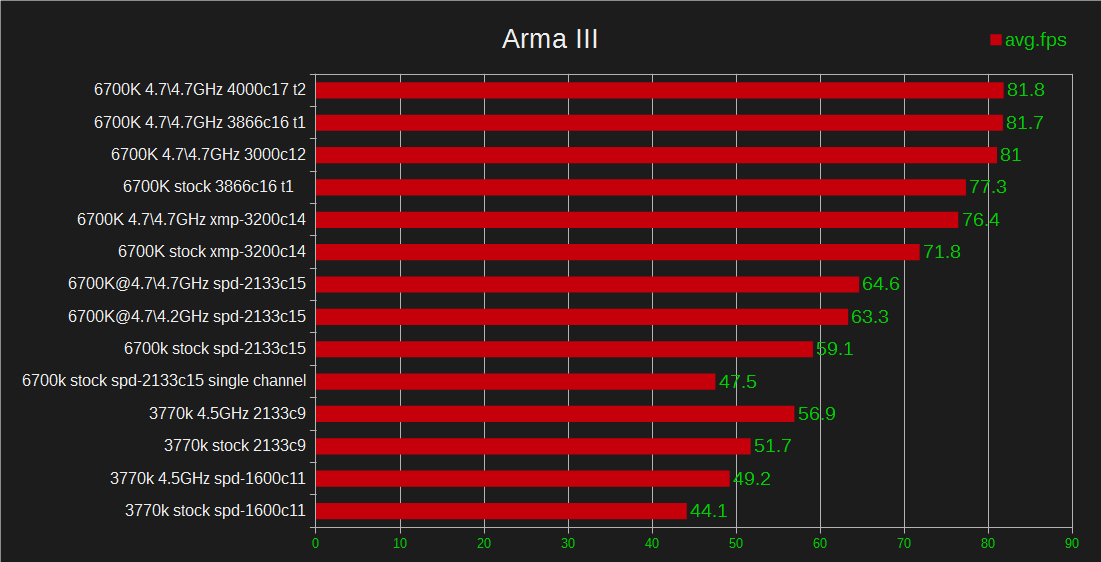8350rocks
Distinguished
juanrga :
goldstone77 :
juanrga :
Benches used stock settings for memory. Overclocking RAM favors both Intel and AMD, as has been demonstrated again and again in this thread. OC RAM is not a magic bullet that will reduce a ~15% microarchitectural gap to 0%. I am not going to copy and paste all the graphs again. I will just re-add two of the more favorable cases: one game and one compute


Also I got info from a RyZen user that just installed the new AGESA that supposedly fixes RAM latency on RyZen. Yes, the new AGESA reduces latency by about 6 nanoseconds, but he lost OC capacity and is now running back RAM at 2400MHz. Any minor improvement on same clocks latency has been lost due to reduction in frequency. In his own words:
Also I got info from a RyZen user that just installed the new AGESA that supposedly fixes RAM latency on RyZen. Yes, the new AGESA reduces latency by about 6 nanoseconds, but he lost OC capacity and is now running back RAM at 2400MHz. Any minor improvement on same clocks latency has been lost due to reduction in frequency. In his own words:
If anything, the Agesa 1004a update caused me problems. It killed my RAM overclock. Have to run at 2400 now. So AMD is moving in the wrong direction with optimizations and fixes.
Can you use valid sources? I'm not sure where those foreign benchmarks are coming from. And no idea what their test setups were. RAM directly affects Infinity Fabric, and has a much greater affect on system performance than RAM does on Intel! And each users experience with Ryzen will vary with each system motherboard, updates, etc!
Uh? I am using Hardware.fr because they have provided the most extensive review of Zen. They are a well-known top site and they have tested virtually anything about RyZen: IPC, latency, throughput, BIOS updates, CCX-CCX interconnect, SMT, core parking, scheduler, power management policies,... and it is simpler to me to go their site and take anything that I need, instead goggling a dozen of reviews to check what site has the info I need, like this bench showing how Skylake improves performance on ARMA3 with faster RAM

RAM affect directly Infinity Fabric and this is only relevant if you are using a memory-bound workload. And memory bound workloads also run faster on Intel chips when the RAM is overclocked.

Arma3 is known to respond to faster RAM above and beyond almost any other game. Only Fallout 4 is as sensitive to RAM speed as Arma 3 is.
Look at the Division benchmark, for example...where a 6700K sees next to no gain for faster RAM speeds. The examples you provide are not a complete picture. You are merely citing what is convenient to try to support your own statements.
For example, Lame seems to show a deficit in encoding...however...Eurogamer used handbrake.
http://www.eurogamer.net/articles/digitalfoundry-2017-amd-ryzen-7-1800x-review
Handbrake shows a H.264 difference in favor of Ryzen by ~10%, while H.265 shows a difference in favor of the 6900K of about ~5%. I think handbrake is vastly more representative of what a typical person would use to encode video...but to each their own.
There are also many more examples that countermand your statements. For example, computerbase.de shows Ryzen is typically about 8% behind at most in nearly any application workload. In several, Ryzen is even better. I would link the site, but they would likely remove the link because you have to translate the page to english from german. However, I very much trust computerbase.de over any other review site.




